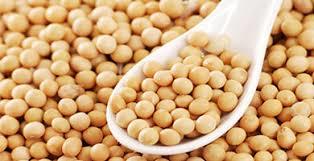Organic Soybean Seeds
The Organic Soybean Seeds offered by our manufacturing company are grown in favorable conditions. These soy seeds are further processed and cleaned in-house. The pure seeds are highly nutritious, healthy and low in fats. These golden yellow, oval shaped seeds contains high protein content and oil; higher than any other grain or pulse. It is also a rich source of minerals and vitamin. Organic Soybean Seeds can be sprouted for additional Vitamin A and Vitamin C nutritious value. Secured in tight packets, for instance, in PP bags these seeds are used packaged.
Features:
- Fresh and safe to consume
- Used in meals and dairy products
- Free from cholesterol
- Used in solvents, like oil, lecithin liquid, etc.
Technical Specifications:
| Organic Soybean Seeds (machine cleaned ) |
| Moisture | 10% (Max) |
| Purity | 99% (Min) |
| Foreign Matter | 1% (Max) |
| Split | 2-3% (Max) |
| Protein | 37 - 42% (Max) |
| Damages | 1.5-3% (Max) |
| Origin | Indian |
| Packing | In strong pp bags of 40/50 kg packing net/gross |
| 1fcl/20ft | 23.5mt/1fcl |
| Oil Content | 18 -19% (Max) |
| I.T.C. H.S. Code | 12010090 |
| Used | For oil purpose & human consumption |
Certified Organic and Non-GMOOur soybeans are cultivated organically, ensuring they are entirely Non-GMO and free from synthetic fertilizers or pesticides. Each seed is tested for purity and meets international standards, making them safe for both human and animal consumption. You can trust their origin and quality from reliable Indian distributors and exporters.
Suitable for Versatile ApplicationsWith their exceptional protein and oil content, these soybean seeds are ideal for a wide range of applications including food products, oil extraction, and animal nutrition. Whether you need bulk supplies for manufacturing or smaller packs for personal use, our products are tailored to every requirement.
Stringent Quality and Safe StoragePost-harvest, our organic soybeans undergo sun drying and meticulous cleaning, resulting in low foreign matter (max 0.2%) and negligible broken or insect-damaged seeds. To maintain optimum freshness and quality, it is advised to store them in a cool, dry place, extending their shelf life up to 12 months.
FAQs of Organic Soybean Seeds:
Q: How should I store organic soybean seeds to maintain their quality?
A: Store the organic soybean seeds in a cool, dry place away from direct sunlight and moisture. Proper storage helps preserve their natural protein and oil content while extending the shelf life up to 12 months.
Q: What are the primary uses of these organic soybean seeds?
A: Our organic soybean seeds are suitable for human consumption, oil extraction, and animal feed. Their high protein and oil content make them ideal for a variety of culinary, industrial, and agricultural applications.
Q: When are the soybeans harvested and processed?
A: We harvest soybeans at full maturity from 100% mature crops to ensure maximum nutritional value. After harvest, they are sun-dried and carefully cleaned before packaging and distribution.
Q: Where are these organic soybean seeds sourced from?
A: These soybeans are sourced from select organic farms in India, adhering to stringent cultivation and processing standards. Our supply chain ensures traceability from farm to final packaged product.
Q: What is the process used to ensure the purity and quality of the soybeans?
A: The soybeans are sun-dried, thoroughly cleaned, and screened to minimize admixture, broken seeds, and foreign matter. Only Grade A seeds with a minimum 99% purity are packaged for sale.
Q: Can these soybeans be used directly for human consumption?
A: Yes, our soybeans are Grade A edible seeds, free from GMO, with low levels of foreign matter, and are safe for direct use in cooking or processing into various food products.
Q: What are the key benefits of choosing organic, non-GMO soybean seeds?
A: Organic, non-GMO seeds offer assurance of purity, safety from harmful chemicals, and enhanced nutritional profiles. They are environmentally friendly and suitable for health-conscious consumers and sustainable agricultural practices.
